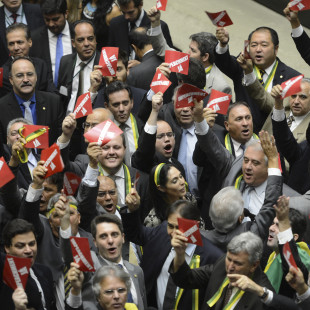18/03/2016 15:47
Recent political events in Brazil show that its economic and financial elites, along with the courts and prosecutors, are trying to break with the country’s immature and non-radicalized democracy. Despite well-grounded criticisms of Luiz Inácio Lula da Silva and Dilma Rousseff’s governments, which fell short of expectations raised by thousands of human rights militants and defenders, the present situation demands a resounding critique of pro-coup opinions being spread by the corporate media, by opposition parties and by members of the judiciary. This is not about defending a government or ignoring the fight against corruption. The entire history of capitalism teaches us that corruption is part of the system and must always be fought.
Yet the courts are not concerned about getting back all the money stolen from taxpayers. The ultimate targets of recent initiatives by judges and the Federal Police investigating corruption accusations have clearly been the Workers’ Party (PT) and people linked to Lula and Dilma’s governments, all of them marked for political annihilation, to make sure that at least Lula loses his political rights and can never again run for – or ever be named to hold – any public office. Nor can Dilma be allowed to conclude her second legitimate mandate as President, although she spent the entire first year (2015) implementing the agenda dictated by Brazil’s financial and economic elites, while guaranteeing the primary budget surplus, signing an Anti-Terrorism Act and amending the Pre-Salt Law to no longer require Petrobrás be a partner to all contracts. Yet all these efforts to be docile to corporate interests could not contain the elites’ drive to break up socially-oriented income distribution policies like the Family Stipend and the real income gains from a higher minimum wage.
Instead, in the opinion of FASE and other social organizations and movements, many players in the courts and in the political and economic system, under the pretext of fighting corruption, tried to carry out a coup and worsen living conditions for the majority of the Brazilian people. The goal of the economic and political elites is to eliminate the minimal social progress achieved during Lula and Dilma’s governments. They hope to exacerbate the wave of conservatism advancing through several countries in Latin America, Europe and the United States.
Fascist and conservative positions inciting LGBTphobia, racism, male chauvinism, violence against the poor and the criminalization of social movements have advanced in recent months. Behind it all, we see a pro-coup opposition movement twisting the 1988 Constitution, but incapable of presenting alternatives to pull the country out of this crisis and generate wealth that can be shared, with income distribution and social justice. Quite the contrary, they are bent on tightening the belts of workers and making life even easier for bankers. And their conservative arsenal uses the old trick of wearing down and disqualifying institutions for mediation and representation, in order to anoint new leaders who trample on fundamental principles underlying life in a society that hopes to expand democracy and respect diverse opinions, alternative practices and universal social rights.
Once again, the priority is to assure constitutional rights and due legal process, even when they have become so dysfunctional they sound like story tales, and to build a platform of demands putting an assessment of the public debt back in the center of debates. This is the only way for the federal budget to allow social policies to expand, restructure taxes, move to democratize the media, implement land reform and build alternatives guided by environmental justice in urban areas, the countryside, rivers and forests.













